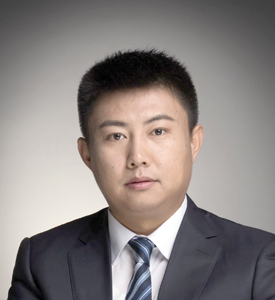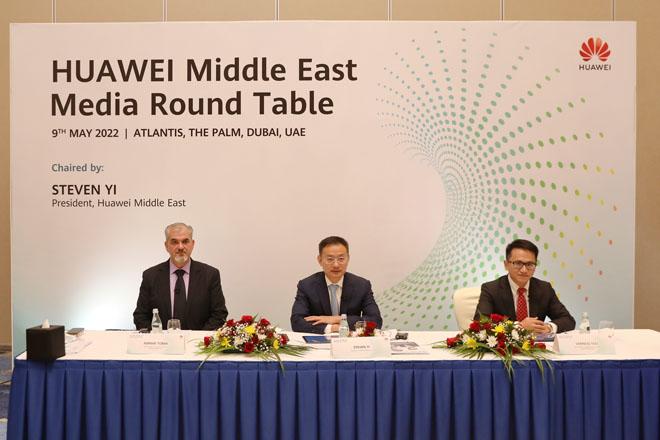You are here
Huawei joins Jordan’s march to become regional ICT hub, says CEO
By JT - Dec 01,2022 - Last updated at Dec 01,2022

Ethan Wang
AMMAN — As Jordan enjoys a productive environment for IT development with its vast pool of talent, Huawei Jordan, with its 17-year presence in the Kingdom, is joining the country’s efforts to become a regional ICT hub, said Ethan Wang, CEO of Huawei Jordan.
Following is the full text of the interview:
Q1: Jordan’s digital transformation is accelerating with the adaptation of more e-government services and an increase in data processing. How do you see the readiness of Jordan's ICT market to deal with the increasing demands of the digital world?
Jordan already enjoys strong ICT credentials, providing a solid foundation to build a digital economy. The ICT sector accounts for 3.8 per cent of the country's GDP, with total annual revenues exceeding $2.3 billion. The latest figures reveal that more than 900 companies are active in the sector, directly employing around 22,000 people. What's more, figures show that 23 per cent of MENA tech entrepreneurs are Jordanian — even though the country accounts for just 3 per cent of MENA's population. Moreover, 50 per cent of the population is under 24, with 22 per cent holding IT, computer science, and engineering degrees.
His Majesty King Abdullah II’s vision of making Jordan a distinguished regional hub in the field of ICT and the digital economy. Given the foresight of its visionary leadership and extensive government support, Jordan has a modern and mature ICT infrastructure in general and the telecom sector in particular.
Its three telecom operators — Zain Jordan, Orange Jordan, and Umniah — have done an excellent job in serving the telecom market and providing the industry-leading solutions and services, both B2B and B2C, to the residents of the Kingdom.
Furthermore, Jordan’s Economic Modernisation Vision has ICT and advanced technologies as key pillars. And the Kingdom has identified technology as a driver and enabler of economic and social growth.
The Intelligent World 2030 report predicts that there will be more than 200 billion global connections by 2030 and every enterprise, household and individual on this planet will have 10-gigabit connectivity. In line with Jordan's Economic Modernisation Vision and REACH2025, digital transformation is taking place across the country at an accelerated pace, with the ICT sector contributing 12 percent to the country's GDP.
The Ministry of Digital Economy and Entrepreneurship has created policies to transition the country towards a digital economy and support the enabling pillars, including Digital Entrepreneurship, Digital Skills, Digital Financial Services, Digital Infrastructure and Digital Platforms.
In conclusion, Jordan has succeeded in creating and developing a highly competitive ICT sector and currently serves larger regional markets in the age of technology and innovation and contributes significantly to the county's increased global outlook.
Q2: What do you think distinguishes Jordan from other regional and international ICT markets?
Jordan's greatest resource has always been its talented youth. They benefit from a modern educational system that has made the Kingdom a regional model for developing its education system. The country has also crafted multiple public-private initiatives to ensure that the outputs of the educational system meet the evolving demands of the global economy and that students are equipped with the tools to compete and excel in the marketplace.
In IT skills, the focus is on accelerating Jordan's transition into a digital economy and integrating technology into public schools by equipping students and teachers with IT and digital skills. Today, Jordan has 29 private and public universities, all of which are bilingual. The total number of ICT graduates in the 2020/2021 academic year in Jordan stood at 7,247.
As per a 2021 study, 27 per cent of MENA's tech entrepreneurs are Jordanians, despite having only 3 per cent of the population. Jordan's ICT sector boasts more than 600 technology companies and startups.
According to Korn Ferry, there will be a global shortage of more than 85.2 million skilled people by 2030, causing a financial impact worth $8.452 trillion. Therefore, developing a robust pipeline of local ICT talent and building the ICT talent testem in Jordan is vital for securing its future digital economy.
Q3: What is Huawei doing to support the ICT talent innovations in Jordan
Investment in the ICT talent ecosystem is one of our key mandates for Jordan. Towards that end, Huawei has trained more than 10,000 high-tech ICT talents for Jordan through its ICT academy, ICT competitions, Seeds for the future and other programmes with the support of related government and partners. Moving forward, Huawei plans to train more than 30,000 ICT talents.
We utilise our expertise in key fields such as 5G, cyber security, AI, Routing & Switching and Cloud computing to provide trainees with the advanced knowledge and expertise required for the job market. Subsequently, Huawei Jordan has partnered with German Jordanian University, Al Balqa Applied University, Hashemite University, Princess Sumaya University for Technology and Jordan University of Science and Technology to establish Huawei ICT Academies, a demonstration of Huawei’s open partnership spirit for building the ICT talent ecosystem in Jordan.
Jordanian teams have traditionally performed admirably in our global ICT contests. A Jordanian team ranked third in the Huawei ICT Competition Middle East region and participated in the global finals of the Huawei ICT Competition 2021-2022 in Shenzhen, China.
Just recently, Huawei and Talal Abu-Ghazaleh University College for Innovation (TAGUCI) signed an MoU to collaborate on nurturing technology innovation, cultivating ICT talent and supporting the development of Jordan’s ICT ecosystem. These initiatives aim to prepare the next generation of ICT leaders who will help the country’s digital transformation vision toward economic modernisation and unleash the potential to build the future.
Q4: Jordan government announced the launch of 5G. What would be the added value from Huawei compared to other vendors when it comes to 5G implementation in Jordan
Huawei maintains global leadership in many ICT domains, including 5G. This success has its roots in the company’s commitment to innovation. Huawei’s R&D spending reached a high point in 2021, investing about $22.38 billion, representing 22.4 per cent of its total revenue and bringing its total R&D expenditure over the past ten years to over $132.5 billion. In 5G, Huawei began research as early as 2009 and has the highest number of 5G patents of any company globally. Huawei has also established 13 Open Labs worldwide — including in the Middle East — to support open collaboration for shared success in areas like 5G and others.
Today, Huawei holds the No.1 ranking for 5G market share globally, with 50 per cent of networks globally powered by Huawei, including a presence in all Middle East countries. Globally, Huawei has supported stable operations in more than 170 countries and regions, serving over one-third of the world’s population.
In Jordan, Huawei has continuously contributed to the Jordan ICT industry for 17 years, served 100 per cent of Jordan’s population by collaborating with the three operators and achieved a record of zero network accidents in 17 years. Huawei is committed to supporting the development of Jordan’s telecom sector and the wider ICT ecosystem, which includes its ICT talent ecosystem. We have continuously invested in several CSR initiatives and programs targeted at nurturing the local talent. With these initiatives, Huawei aims to develop the future technology leaders that can drive Jordan’s digital transformation, socio-economic development and the Kingdom’s future digital economy.
As a global ICT leader with a successful track-record in 5G, Huawei is looking to introduce its 5G network benefits to Jordan, coupled with AI, Cloud and other advanced technologies to better serve the citizens’ needs. We also call for maintaining a fair, unbiased and transparent 5G business environment. We believe that providing equal opportunities to all global telecom vendors based on a proven track record of existing work with operators, global experience, cost and industry standards will ensure the international competitiveness of Jordan’s telecom market.
Having led in the first wave of 5G deployment, Huawei is now leading in its evolution. Huawei first proposed an outline for 5.5G in 2020, and 3GPP officially named the concept “5G-Advanced” in 2021. 5.5G is a crucial milestone on our path to an intelligent world; it will deliver 10Gbps experiences, satisfying various needs for entertainment, connectivity, and other applications. AI will be fully integrated into enterprise production processes on the industrial front, and the size of the 5.5G IoT market will grow rapidly.
Q5: What are Huawei’s commitment highlights to Jordan ICT?
As a global ICT leader, Huawei is aligned with the digital transformation and Jordan’s Economic Modernisation Vision by supporting the evolution of the telecom sector, introducing 5G and bringing advanced global markets experiences to Jordan. We have vast regional experience, having powered the first wave of regional 5G implementations. Today, GCC countries are leading the 5G deployment globally. We are honored to support mega events in the Middle East with our 5G capabilities, providing unprecedented and exceptional experiences. Qatar World Cup and Haj network guarantee over 16 years are just 2 examples of our success stories in the Middle East region.
In September, Huawei launched a public cloud service and startup programme in Jordan to accelerate the digital transformation of SMEs by providing free technical training, a free cloud service package, and the digital economy’s thriving.
Jordan has built an ecosystem that provides a strong value proposition for international companies. We are happy that the regulators have created a fair and open environment for industry vendors and partners, so we are optimistic about the future development of both 5G and digital technologies. We believe that we will see Jordan lead the region in digital transformation.
Related Articles
DUBAI - During an exclusive media roundtable held on the sidelines of the SAMENA Leaders’ Summit 2022, the top telecom industry event hosted
Plans are underway to roll out 5G in Jordan, heralding a digital-led future for the Hashemite Kingdom.
AMMAN — The national winners in Jordan from this year’s Huawei Middle East ICT Competition, held in partnership with the Ministry of Digital












